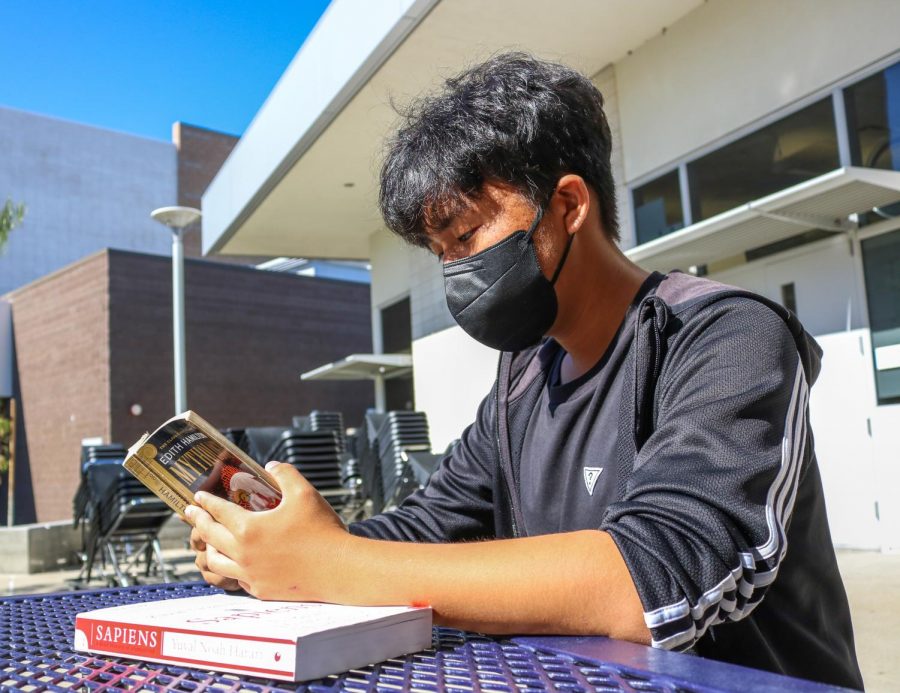Sophomore Brian Kim Creates Current Connections to History
Sophomore Brian Kim reads “Mythology” by Edith Hamilton, a book that depicts Greek, Roman and Norse mythological stories. Kim said he used the book to gain insight into the opposing side of his stance and explore how the author portrayed the western stories. According to Kim, the book provided contrast he was able to reference when mentioning the portrayal of other non-western subjects such as how Buddhism spread to other cultures, a topic he explored in his research journal. He also referenced the book “Sapiens: A Brief History of Humankind” by Yuval Noah Harari to develop background knowledge on early human history, culture and religion.
Numerous tabs of articles fill sophomore Brian Kim’s laptop screen, and heavy books stack on top of each other next to his computer. His fingertips dance on the keyboard, drafting a collection of words to represent months of research for his paper.
Hours of reading and writing may not seem enjoyable for some students, but for Kim the occasion has not only been an opportunity for him to expand his passions for history and writing, but also connect contemporary issues with his knowledge of the past as well as step closer to his goals for the future of becoming a history professor at a university.
After taking Honors Modern World History in his freshman year, Kim wrote an individual paper “Addressing the Exclusionary Nature of Eurocentric World History Instruction,” which expanded on certain aspects of world history often disregarded in U.S. curricula, such as the AP courses developed by College Board and the importance of exploring beyond Eurocentric standards in history.
After nearly three months of researching historical evidence and textbooks to support his stance with multiple books, journals, websites and articles over the summer, Kim finally submitted his literature review critique, a type of research study paper, to the Journal of Student Research, who evaluated his paper for three months. Kim then received an email on Oct. 2, notifying him that his research would be published in the journal in two to three weeks. Although he is still waiting for his paper to be officially published, he estimates it will take around two additional weeks.
One of the main topics he explores is the spread of Buddhism from India to China and the expansiveness of the religion.
“I mainly focused on the spread of Buddhism throughout China,” Kim said. “I was intrigued by how it assimilated into Chinese culture—although it originated from India—not just through commerce but also how the government and people accepted it as a set of beliefs not just a religion.
After researching multiple curricula from different districts as well as the standards for AP World History, Kim said he noticed that the topic was only briefly discussed and especially did not expand on the actual changes caused by assimilation within China; rather, the curriculum focused on more of a westernized view, covering only the shallow information of the silk road.
“I want readers to learn that AP courses are great, and world history is also amazing,” Kim said. “But I also want people to focus on, maybe outside of their courses, just how important other factors and aspects of history are, because that’s what affects our daily lives rather than what’s just shown in the courses that we take.”
Although he wrote the paper independently, Kim said that social studies teachers Daniel Hunter and Natasha Schottland, his freshman year history teachers, inspired his work as they helped him not only learn about history but also develop his writing skills.
“Here in Portola, we really try to stay away in world history from Eurocentric ideas. It’s world history for a reason, so we try and touch on history in parts of Asia, history in Africa, all of those types of things,” Schottland said. “So that makes me really happy to hear that he’s discussing and researching the ways in which world history is taught because we really try and stress that in the curriculum.”
According to Kim, he has been passionate about history since seventh grade, participating in events such as National History Day for the past two years, but he started exploring his interests in historical research in ninth grade. Currently, Kim is working on another research paper studying the failure of the Blitzkrieg military tactic in World War II, and he said that he hopes to publish more research on other topics in the future.
“I think history is intriguing because, whatever subject we learn, it’s always connected to history in the end,” Kim said. “Anything we do, whether it’s contemporary or in the past, I think it relates back to history all the time, and that’s what drove me to learn more about history.”
Your donation will support the student journalists of Portola High School. Your contribution will allow us to purchase equipment and cover our annual website hosting costs.

Bia Shok is the co-news editor for her third and final year on the Pilot! She is super excited to expand the Pilot’s influence even further this year...




